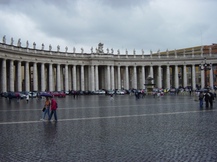|
All nations are accountable to God. Around the time of King Josiah's reforms (2 Kings 22-23), Zephaniah proclaimed the coming judgment of the Day of the Lord (Zephaniah 1:14-2:3) to Judah (1:4-13) and the nations (2:4-15). From Judah four woe oracles are addressed to Assyria (north), Ammon & Moab (east), Ethiopia (south), and Philistia (west), representing all nations in all directions who are accountable to God for worshiping false gods when He is the one true God (2:11). Fortunately, Judah and the nations are promised restoration once their rebellion is purged (3:9). Today, we must not assume as Judah did that God's people will escape judgment for errors of omission by drifting away from God (3:2) and errors of commission by misusing pastoral and leadership positions at the expense of congregations and employees (3:4). Most importantly, the nations are still accountable to God today, but they need messengers to bring them the good news of Christ's atoning work on the cross (Romans 10:14-15). Thus, we must reach our local Judah through apologetics and the surrounding nations with evangelism.
0 Comments
 Logically, to know anything with absolute certainty one must know everything about everything through all time to know with certainty that no new information will debunk what is known about something; unless, someone who does know everything about everything with absolute certainty conveyed to us some true facts about the universe. Of course, the only being with unlimited power to ascertain such unlimited knowledge would necessarily have to be God. Don't despair despite the darkness. In Habakkuk, the prophet revealed his questions and his struggle with God’s apparent absence (Habakkuk 1:2-4). God responded by revealing that He is raising up the Babylonians to judge Judah’s evil, which doesn’t comfort Habakkuk (1:5-11). Since Babylon is even more vile than Judah, the prophet balks at God’s plan (1:12-2:1). Habakkuk is then told to record a vision of the Babylonian’s judgment for their violence, which reveals God’s sovereignty (2:2-20). He then reveres God and prays for mercy and faith (3). We still question God’s plan when it doesn’t fit our plans or expectations. However, everything from financial stewardship questions to life catastrophes may simply be God asking “do you trust me?” In fact, God’s plan may call us to endure trials and sufferings as a missionary for His namesake (Luke 18:29). Yet, despite our inability to see God’s ways, we can stand firm knowing that the creator of the universe not only knows what is best for us, but also reveals Himself to those who seek Him (Jeremiah 29:10). Then we too can live by faith as Habakkuk declares (2:4).
Justice requires judgment. The prophet Nahum declared that the crimes (Nahum 1:11) of Ninevah (the capital of Assyria) against Judah and the nations will be judged (1:3). Ninevah's day of distress is pictured as futile while an enemy conquers the mighty city (2:1-10) and her deeds are repaid (2:11-12). The “city of blood” then receives further woe not only for military cruelty, but also idolatry and occult practices (3:1-4). Nahum concludes by saying that all nations will rejoice when God brings justice by carrying out judgment down to Assyria's king himself (3:19). People today still cry out for justice against new Ninevahs, even atheists who see death as an escape from consequences. Yet, only God can provide true justice, since his justice is both temporal and eternal. Like Assyria's, every temporal evil committed yesterday till the end of the age will be righted by Christ (Revelation 19:11). All evil must be judged or else justice becomes a mockery, like in Universalism where there is no payment for wrongs. Thus, only those who accept Christ's just substitution for their judgment will enter into his presence (Romans 3:25).
 What place does our faith have in the “public square” today? When Jesus began his ministry Jews expected that the Kingdom of God He announced would reinstate King David's political state. They missed the all encompassing and timeless plan revealed in the spiritual aspect of Christ's teachings. Yet, today many are in danger of repeating the Jew's misunderstanding by mistaking the Kingdom of God for the Kingdom of America. The proud will be humbled. Obadiah prophecies against Edom calling the nation proud, yet deceived (Obadiah 3). Blinded by pride, Edom (the descendents of Esau ) will be betrayed by his closest allies (7), just as the he betrayed his 'brother' Judah (the descendents of Jacob) (10). Obadiah announces that on the Day of the Lord the tables will turn on Edom and he will receive retribution for his actions (15-20), because Edom took advantage of God's people and abused them during their sufferings (12-14). Obadiah concludes that in the end Edom will belong to the Lord (21). “Pride comes before the fall” is still a cliché for individuals, religions, and nations (Proverbs 16:18). Anyone who takes pride in their body or their work will watch it fade away, or like Edom watch it turn against them. In this world or the next, the New Atheists who arrogantly proclaim science has killed God will be silenced by Truth. Entire nations may fall due to their pride, just as Judah did because of Hezekiah (Isaiah 39). Even superpowers need to ensure that patriotism doesn't turn to pride since the Day of the Lord will include all nations (Obadiah 15).
Trust is the basis of servanthood. Countless individuals are called to trust God in the 66 chapters of Isaiah's prophecies. Isaiah himself nearly comes undone in God's throne room except for his trust in God (Isaiah 6). King Ahaz is contrasted as failing when he trusts in Assyria to deliver him and not God by denying the sign of Immanuel (ch.7). Woe oracles are then given to the nations and Judah due to their lack of trust in God (ch.13-23). Later, King Hezekiah's trust delivers Judah from Assyrian domination (ch.37). Finally, Isaiah foretells of the servant Jesus who would display perfect trust (ch.42). Today, trust in God is rarely more than a slogan printed on money. Sadly many only “trust” in God when they feel blessed, and then question instead of rejoicing when sufferings come (1Peter 4:13), even though a true servant is measured by their trust in God during hardships (Acts 14:23). Whether we face the loss of a job, a treasure, or a loved one, or whether we commit a grievous error, drop the ball, or omit a task, we must continue to trust in God, since it may be that He is refining his servant in the fire (Malachi 3:2).
|
AuthorBrett Yardley: Categories
All
Archives
January 2019
|

